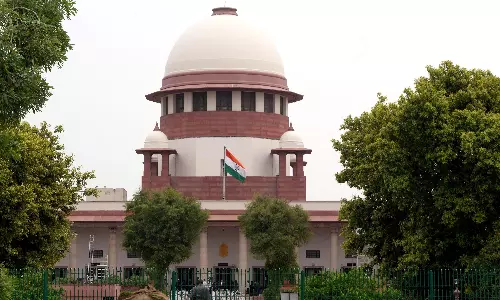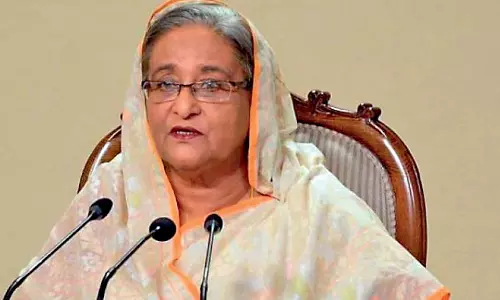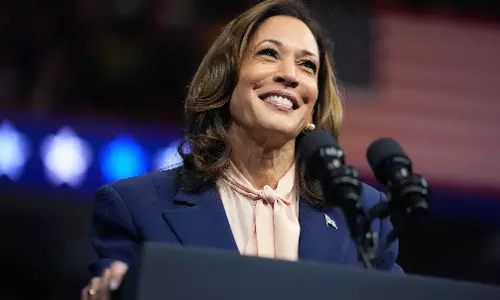High on morality, low on maturity
Two questions have arisen following the rolling back of the ordinance designed to protect legislators convicted of crimes and save them from immediate disqualification. Since the Union Cabinet essentially bowed to pressure from Rahul Gandhi, the Congress vice-president, the first point relates to whether a government can be held to ransom by just one individual.;
Two questions have arisen following the rolling back of the ordinance designed to protect legislators convicted of crimes and save them from immediate disqualification. Since the Union Cabinet essentially bowed to pressure from Rahul Gandhi, the Congress vice-president, the first point relates to whether a government can be held to ransom by just one individual. The second point concerns the correctness of how Mr Gandhi acted. It is easy to conflate those two questions. However, they are separate and need to be viewed and assessed differently. At the simplest, most basic level, there is absolutely nothing wrong in a government changing its mind following urging from an external individual. One may or may not agree with either the original decision or the impact of the revocation — as the case may be — but such instances actually go back to the earliest years of democratic government in India. In 1948, one of the immediate provocations for the assassination of Mahatma Gandhi was his insistence that Jawaharlal Nehru’s government give Pakistan '550 million, as part of the division of British India’s assets between its two successor states. The Cabinet had decided to delay this payment due to the Pakistani invasion of Kashmir. It was hoping to use the money as leverage, particularly at a time when authorities in Karachi — Pakistan’s first capital — were so short of cash that they were finding it difficult to pay salaries. The Mahatma opposed this action and termed it blackmail. He took on Nehru, Sardar Patel and the entire phalanx of the government. In the end, he won and the transfer of funds was agreed too. Nathuram Godse responded in the manner in which he did. Yet, many others — those who did not even remotely mean harm to the Mahatma — felt the great man had curbed the autonomy of the government and should have let it take a decision in its wisdom. The citing of this story is not to draw comparisons between the present predicament and the situation in 1948. It is not to compare Manmohan Singh to Nehru — much less SushilKumar Shinde to Sardar Patel — or to place Rahul Gandhi on the same pedestal as Mahatma Gandhi. None of that is being attempted and none of that is germane. The purpose of this example is only to emphasise that pressure from an individual — obviously an influential individual, whose word counts — has led to revision of government policy in the past and that this has not always been seen as subversion. Indeed, it has been considered part of the normal process of political negotiation, mediation and resolution. As such, that Mr Gandhi disagreed with the ordinance, perhaps changed his mind on the ordinance given public and media hostility and conveyed this to the government is not by itself unprecedented or stunning. Those allies of the Congress who are now telling the media, off the record no doubt, that they are upset about having to bow down to the dictates of the Nehru-Gandhi family and are warning they should not be taken for granted are being economical with reality. The fact is with 206 seats in the Lok Sabha and a vast majority of seats in the ruling United Progressive Alliance (UPA), the Congress and its leadership have always had a decisive say in the policies of the coalition, more so after the victory of 2009. On several occasions, allied parties have swallowed pride and alternative opinion and succumbed to the wishes of Sonia Gandhi, the Congress president. More than one UPA partner had misgivings about the Land Acquisition Bill. The Food Security Bill was opposed by agriculture minister Sharad Pawar himself. In the end, the allies surrendered to an extra-government authority in the form of the Congress chief. If they didn’t protest then, didn’t complain about the dignity of the Cabinet being compromised and didn’t mutter bitter nothings that this was a coalition government and not a single-party show, they can scarcely do all of that now. Fundamentally, whether the Congress president rammed through her favoured laws or her son nixed an ordinance, it came to the same thing. This takes us to the second point — the process by which Mr Gandhi announced his disagreement. His tone and manner, his language, his hijacking of a media conference, his very unilateralism, his confession a few days later that his mother had told him his expressions and epithets were inappropriate — something it shouldn’t have taken another person, his mother or otherwise, to tell him — was just what Rahul-sceptics needed to reinforce the conclusion that he is a political dilettante. Mr Gandhi and his confidants may consider that uncharitable and unfair. Even so, it is the Congress inheritor himself who has allowed this impression to be created. All the charges of being coalition-unfriendly that the Congress throws at Narendra Modi — he is a solo player, authoritarian and intolerant of dissent and counter-questioning — can come right back to haunt Mr Gandhi. Prospective coalition partners will wonder if he will lose his temper and scream at Cabinet colleagues before stomping out. On the other hand, if he does not take leadership, they will apprehend the likelihood of him springing an ambush on any government backed or helmed by his party. More than anything else, Mr Gandhi’s instincts and responses are not predictable in a framework that can be considered “political”. This is astute positioning for somebody starting out in politics and looking at a 15-year horizon. It is the sort of cachet an Arvind Kejriwal or even an Anna Hazare would aspire for, or a Mamata Banerjee in, say, 1997, when she set up her own party. It sits oddly on the leader of a mainstream political party that is seeking to defend 10 years in office and take a shot at government formation in 2014. In politics and especially in government, morality is desirable; contrived or convenient morality is useful, but maturity is absolutely necessary. That is why Rahul Gandhi lost this past week, even when he won.
The writer can be contacted at malikashok@gmail.com





